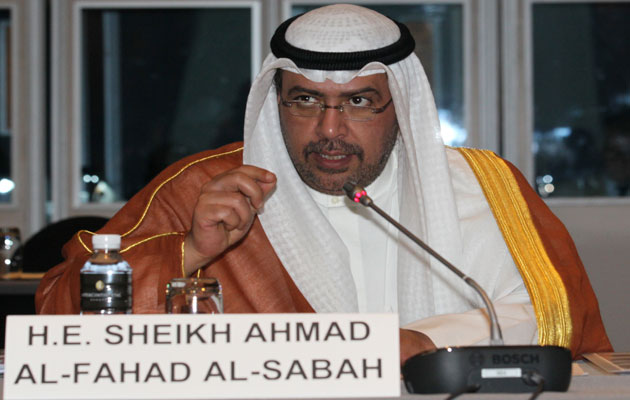Asian football is about to brazenly throw democratic niceties out of the window in the cause of ensuring Sheikh Ahmad Al-Fahad Al-Sabah takes his first step down the road towards the eventual presidency of FIFA.
Known simply in sports circles as ‘The Sheikh,’ the Kuwaiti former head of oil cartel OPEC has established himself as a major power broker through his roles as head of the Association of National Committees (ANOC), the Olympic Council of Asia (OCA) and the richly influential Solidarity Commission of the International Olympic Committee.
Now, not content with having ‘placed’ Bahrain’s Sheikh Salman bin Ebrahim Al Khalifa as president of the Asian Football Confederation, he apparently has eyes on 2019 and election to the top job in the world football federation.
Two months ago the Kuwait football federation nominated Sheikh Ahmad for the forthcoming two-year vacancy for an AFC delegate to the FIFA executive committee.
In all, three slots on the FIFA exco need to be filled by AFC Congress in Bahrain on April 30, with the unchallenged Sheikh Salman already assured of Asia’s FIFA vice-presidency.
However, while two of the slots are for four years, one is for two years. This is due to some arcane political manoeuvring after Sheikh Salman’s assumption of the AFC presidency in succession to the disgraced Qatari, Mohamed bin Hammam.
The FIFA exco candidates were named on March 5 by the AFC with no hint of back-room wheeler-dealing. The election procedure is sequential. The candidate with fewest votes drops out until only three FIFA-bound ‘survivors’ remain.
Under current statutes the top two would take the four-year slots with the third-placed candidate taking up the two-year role.
He wants the two-year slot for a specific reason – so he can be re-elected for four years in 2017. Thus he would enjoy two secure years in which to campaign for the FIFA presidency itself in 2019 (assuming that Sepp Blatter will finally feel inclined to step aside at long-overdue last).
So far, so good.
Under present rules Sheikh Ahmad, such is his patronage, would probably finish top of the pile and have to take up the four-year slot.
Hence, to ensure he wins the two-year slot, AFC associations have suddenly found themselves confronted by a proposal – from Guam among others – to approve a statutes change just minutes before they vote . . . to split the election in half.
First they would vote on two nominees for the four-year positions and only then would they vote, separately, on the two-year post.
This means, in effect, that the nominated candidates turn up at congress uncertain of whether their campaigns and vote-winning strategies were targeted appropriately.
As one ex-AFC staffer said: “You have to remember this isn’t a western democracy, this is the AFC.”
The manoeuvring illustrates that the AFC has made little progress since Bin Hammam was expelled from football for life by FIFA not for the notorious Port-of-Spain bribery scandal in 2011 but for misuse of AFC funds.
Sheikh Salman came to power in 2013 – with Sheikh Ahmad’s support – promising to drive the AFC into a new, progressive era.
In fact, no serious attempt has been made to resolve concerns over the controversial World Sports Group commercial contract and the disturbing complexities emanating from the Bin Hammam affair.
The future looks bright nonetheless . . . on the horizon is an Asian Gulf World Cup in 2022 in Qatar and perhaps under the approving eye of an Asian Gulf FIFA president.
** FIFA exco candidates:
HRH Prince Abdullah Al-Haj Ibni Sultan Hj Ahmad Shah (Malaysia; Zone: ASEAN)
Dato’ Worawi Makudi (Thailand; Zone: ASEAN)
Mong Gyu Chung (Korea Republic; Zone: East)
Kohzo Tashima (Japan; Zone: East)
Saoud A. Aziz M A Al Mohannadi (Qatar; Zone: West)
Sheikh Ahmad Fahad Al Ahmad Al Sabah (Kuwait; Zone: West)
HE Sayyid Khalid Hamed Hamood Al Busaidi (Oman; Zone: West)







